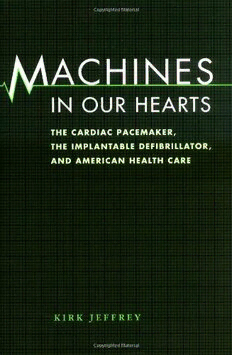
Machines in Our Hearts: The Cardiac Pacemaker, the Implantable Defibrillator, and American Health Care PDF
387 Pages·2001·1.053 MB·English
Most books are stored in the elastic cloud where traffic is expensive. For this reason, we have a limit on daily download.
Preview Machines in Our Hearts: The Cardiac Pacemaker, the Implantable Defibrillator, and American Health Care
Description:
Today hundreds of thousands of Americans carry pacemakers and implantable cardioverter-defibrillators (ICDs) within their bodies. These battery-powered machines—small computers, in fact—deliver electricity to the heart to correct dangerous disorders of the heartbeat. But few doctors, patients, or scholars know the history of these devices or how "heart-rhythm management" evolved into a multi-billion-dollar manufacturing and service industry. Machines in Our Hearts tells the story of these two implantable medical devices. Kirk Jeffrey, a historian of science and technology, traces the development of knowledge about the human heartbeat and follows surgeons, cardiologists, and engineers as they invent and test a variety of electronic devices. Numerous small manufacturing firms jumped into pacemaker production but eventually fell by the wayside, leaving only three American companies in the business today. Jeffrey profiles pioneering heart surgeons, inventors from the realms of engineering and medical research, and business leaders who built heart-rhythm management into an industry with thousands of employees and annual revenues in the hundreds of millions. As Jeffrey shows, the pacemaker (first implanted in 1958) and the ICD (1980) embody a paradox of high-tech health care: these technologies are effective and reliable but add billions to the nation's medical bill because of the huge growth in the number of patients who depend on implanted devices to manage their heartbeats.
See more
The list of books you might like
Most books are stored in the elastic cloud where traffic is expensive. For this reason, we have a limit on daily download.
